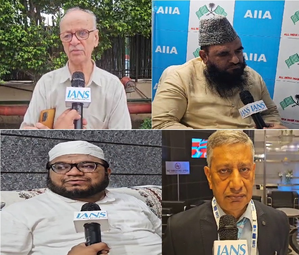National
Bangladesh Islamist leader's plan of implementing Sharia spells trouble for region
New Delhi, Aug 21 (IANS) Fearing Bangladesh could well be the next Pakistan in the making in India’s troubled neighbourhood, several scholars and experts on Wednesday severely condemned the recent statements given by Shafiqur Rahman, the radical leader who currently heads Bangladesh Jamaat-e-Islami (BJI), in which he has openly backed implementation of Sharia law in the country.
Rahman, the Ameer (Chief) of the largest Islamist party in the country which has been banned from contesting elections, was arrested in December 2022 before being released in March, this year.
Over the past few weeks, Bangladesh has witnessed massive unrest and violence against minorities – especially targeting the Hindu community in the country – following former Prime Minister Sheikh Hasina’s resignation on August 5.
Even though Muhammad Yunus, sworn in as the chief advisor of the interim government, pledged to take control of the situation, massive atrocities were committed against the Bangladeshi Hindus.
Experts reckon that the BJI chief’s latest comments will only embolden the radical elements in Bangladesh who are currently enjoying a free run.
“The way minorities have been harmed in Bangladesh is extremely condemnable. Now, Rahman is talking about implementing Sharia in the country which could lead to further suppression and harassment of people. Threatening people, and destroying their homes and temples is completely against Islamic teachings and customs. India helped Bangladesh in getting independence in 1971 and saving people from Pakistan. For this, every Bangladeshi should be indebted to India,” said Mufti Shamoon Qasmi, an Islamic scholar who is also the Chairman of the Uttarakhand Madarsa Education Board.
Defence expert Qamar Agha reckoned that “anarchy will spread rapidly” if Sharia is imposed in Bangladesh.
“Investors, including foreigners, will back out as the situation will be quite similar to Pakistan and Afghanistan. Also, the kind of Sharia law which is backed by the Jamaat will not be acceptable to the Sufi society or institutions there. One must not forget that there is division in the Bangladesh Army too and the general public in the country believes in secular politics. Therefore, there is a lot of difference between Bangladesh and Pakistan. Bengali nationalism is deeply rooted in the people of Bangladesh. Besides this, Jamaat-e-Islami is not a very popular force there,” said Agha.
He further said that if Sharia is indeed implemented in Bangladesh, then an attempt will be made to turn the eight per cent of Hindus of the country into second-class citizens, just like Pakistan has done.
“It will be a big problem for the region. It is also clear that the interim government has the support of America. In such a situation, all countries should unite and put pressure on the US. If Sharia is implemented in Bangladesh, it will have a direct impact on India because of the long border. Also, new extremist organisations will be formed there, creating instability in the region. India has made a big investment there and that too will be badly impacted,” Agha added.
Shesh Paul Vaid, former Director General of Police (DGP) of Jammu and Kashmir, commented that the people of Bangladesh will have a big role to play in countering the growing radical forces in the country.
“It is for the people of Bangladesh to decide if they really want to live in conditions like Afghanistan. Do they want to live in a country governed by Sharia law because Bangladesh has been following the path of development. In such a situation, the 1.5 crore minorities there will also have to decide about their future. After the implementation of Sharia, they will not get any rights there and, in such a situation, they may be forced to ask for a piece of land for themselves and live separately. This decision will be taken by the people there,” said Vaid.
Muslim scholar Mufti Wajahat Qasmi reminded that Bangladesh was founded on secular principles by Bangabandhu Sheikh Mujibur Rahman.
“Pakistan was divided in the name of Islam. It was said that Muslims wanted an Islamic system and Islamic discipline. Then those people who had gone to Pakistan tried to separate themselves from the system of Islam and create a secular country. Bangladesh was not divided on the basis of Islam. A large population in Bangladesh is of minorities. Bangladesh has been governed by secular law since its formation. In such a situation, the people of Bangladesh should come forward and answer on their own on such matters,” said Qasmi.
–IANS
jkt/as/dan
National
Defence Ministry: Year 2025 will be year of reforms

On Wednesday, the Defence Ministry announced that 2025 will be designated as the “Year of Reforms,” with a primary focus on establishing integrated theatre commands to enhance collaboration among the three branches of the military.
These reforms are aimed at transforming the armed forces into a technologically advanced, combat-ready force capable of executing multi-domain integrated operations, the ministry stated.
The initiative will emphasize emerging domains such as cyber and space, alongside cutting-edge technologies like artificial intelligence, machine learning, hypersonics, and robotics.
Defence Minister Rajnath Singh described the “Year of Reforms” as a pivotal milestone in the modernization of the armed forces.
“It will set the stage for significant advancements in the nation’s defense capabilities, ensuring the security and sovereignty of India in the face of 21st-century challenges,” he said.
National
A 3.2 magnitude tremor struck Gujarat’s Kutch district on Wednesday morning

A 3.2 magnitude tremor struck Gujarat’s Kutch district on Wednesday morning, according to the Institute of Seismological Research (ISR).
The district administration reported no casualties or property damage following the quake.
The tremor occurred at 10:24 am, with its epicenter located 23 kilometers north-northeast (NNE) of Bhachau, as per the Gandhinagar-based ISR.
Last month, the region experienced four seismic events exceeding a magnitude of 3, including a 3.2 magnitude tremor just three days ago, with its epicenter also near Bhachau.
Earlier tremors in the area included a 3.7 magnitude earthquake on December 23 and a 3.2 magnitude event on December 7, according to ISR reports.
Kutch was also jolted by a 4.0 magnitude earthquake on November 18, 2024. On November 15, a 4.2 magnitude quake hit Patan in north Gujarat, based on ISR data.
Gujarat is considered a high-risk earthquake zone, having experienced nine major earthquakes over the past 200 years, according to the Gujarat State Disaster Management Authority (GSDMA). The 2001 earthquake in Kutch, which occurred on January 26, was the third-largest and second-most destructive in India in the last two centuries, according to the GSDMA.
National
Diljit Dosanjh faces legal action over concert songs

Singer and actor Diljit Dosanjh’s much-anticipated New Year’s Eve concert in Ludhiana faced legal hurdles after a complaint was filed by Punditrao Dharenavar, an assistant professor from Chandigarh.
Following the complaint, the Deputy Director of the Women and Child Department, Government of Punjab, issued a formal notice to Ludhiana’s District Commissioner, urging them to prohibit Dosanjh from performing specific songs during his live show on December 31, 2024.
The notice specifically targets songs accused of promoting alcohol, including Patiala Peg, 5 Tara Theke, and Case (Jeeb Vicho Feem Labbiya), even if the lyrics are slightly modified. The complaint points to previous warnings issued to Dosanjh by various commissions advising against performing these controversial tracks.
Despite these warnings, the singer allegedly continues to perform the songs with minor alterations. Dharenavar raised serious concerns about the influence of such music on young audiences, especially when minors are present at live events.
Adding to the controversy, Dharenavar referenced a 2019 Punjab and Haryana High Court ruling, which directed law enforcement to ensure that songs promoting alcohol, drugs, or violence are not played at public events, including concerts. This ruling underscores the legal basis for the complaint and has further intensified the scrutiny surrounding the event.
National
UP Minister’s convoy overturns, 5 person injured

Five people sustained injuries when a vehicle in the convoy of Uttar Pradesh Minister and Nishad Party chief Sanjay Nishad overturned into a ditch near Januan village in the Khejuri Police Station area of Ballia district late last night.
Sanjay Nishad shared details of the incident, stating that the accident injured five party workers, including four women.
“I was traveling with the convoy to participate in the Constitutional Rights Yatra organized by the party on Tuesday night. Near Januan village in the Khejuri area, one of the vehicles following the convoy lost control while trying to avoid an animal and overturned into a ditch,” Nishad explained.
The injured individuals have been identified as Rakesh Nishad, Ramrati, Usha, Geeta, and Iravati Nishad.
Senior police and administrative officials quickly arrived at the scene following the incident to oversee the situation.
National
Suchir Balaji’s mother alleges Murder


The mother of Suchir Balaji, a 26-year-old former OpenAI researcher found dead after accusing the company of copyright violations, has alleged that her son was “murdered” and called for a Federal Bureau of Investigation (FBI) probe.
Poornima Rao, Suchir’s mother, claimed her son’s death was a “cold-blooded murder” that authorities wrongly ruled as suicide. She further disclosed that a private autopsy report conflicted with the findings of the initial police investigation.
Rao alleged that her son’s apartment had been “ransacked” and cited evidence of a struggle in the bathroom, including bloodstains that suggested he had been assaulted.
“We hired a private investigator and conducted a second autopsy to uncover the truth. The private autopsy does not confirm the cause of death stated by the police. Suchir’s apartment was ransacked, there were signs of a struggle in the bathroom, and it appears he was hit based on blood spots. This is a cold-blooded murder being misclassified as a suicide. Lobbying in San Francisco won’t deter us from seeking justice. We demand an FBI investigation,” Rao wrote on X.
Elon Musk reacted to Rao’s post, commenting, “This doesn’t seem like a suicide.”
Balaji was discovered dead in his San Francisco apartment months after accusing OpenAI of violating copyright laws during the development of ChatGPT, as reported by Fox News. Despite these claims, the San Francisco Police Department found no evidence of foul play and ruled the death a suicide.
On October 24, shortly before his death, Balaji voiced doubts about the “fair use” defense in generative artificial intelligence. “I recently participated in a NYT story about fair use and generative AI, and why I’m skeptical ‘fair use’ would be a plausible defense for a lot of generative AI products,” he wrote on X.
-
Video2 years ago
PM Modi Attacks Congress in Karnataka with “Kerala Story”
-
Politics2 years ago
Siddaramaiah & DK Shivakumar sworn in as Chief Minister & Deputy CM respectively
-
Cricket2 years ago
CSK players rejoice 5th IPL title with their families (Pics)
-
Entertainment2 years ago
Karan Deol weds his longtime Girlfriend Drisha Acharya (Pics)
-
Sports7 years ago
History Of Official FIFA WORLD CUP Match balls
-
India2 years ago
Ashwini Vaishnaw: Railway Board recommends CBI probe in the Odisha railway disaster
-
Entertainment2 years ago
Urvashi Rautela dazzles on Cannes 2023 red carpet (Pics)
-
Entertainment2 years ago
Sunny Leone gets ready for Kennedy premiere in Cannes (Pics)



























